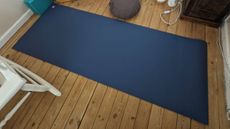Getting the right amount of quality sleep every night is essential to your wellbeing. The average Brit manages around 7.6 hours every night, which is a little less than the eight hours recommended by sleep experts, but if you're getting nowhere near that then the consequences can have a severe impact on your life.
Broken nights leave us feeling lethargic and unproductive the next day, but luckily there are a number of ways in which we can improve our sleep habits. According to Alex Dimitriu, MD, a double board-certified physician in psychiatry and sleep medicine, it helps to accept that we probably won't get the ideal amount of sleep, and work around that realisation. "Seven to eight hours of sleep per night is ideal for most people," she says. "We should aim to be realistic, and ideally create a 'window' of time for sleep of eight or nine hours - with the realisation that despite our efforts, we all end up sleeping a little less than we planned."
There are other ways to improve our sleeping habits; finding the best sleep tracker can help train ourselves into a healthier sleep regime, and treating yourself to the best mattress can make a real difference if an uncomfortable bed is keeping you from restful slumber. But a simpler – and more enjoyable – solution is to treat ourselves to sleep-promoting foods in the evening.
Adding minerals like potassium, magnesium, calcium, and iron onto your plate can help promote the production of melatonin, the hormone responsible for sleep regulation, and there are plenty of delicious ways to do just that. If this approach appeals to you, the sleep experts at hybrid mattress brand OTTY suggest the following bedtime snacks:
1. Cherries
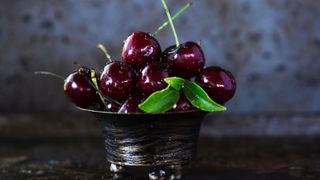
The best way to enjoy a good night's sleep is to increase your melatonin intake, and a perfect way to do this is through the introduction of cherries to your diet. They're great for snacking in front of the TV, can be dipped in melted chocolate as a great alternative to strawberries, and are also fantastic added to a fruit smoothie.
2. Dark chocolate

It's hard to resist a bit of chocolate after dinner, and now you now have an excuse for indulging in that cocoa fix; just ensure you’re stocking up on the dark variety at the supermarket.
Dark chocolate contains serotonin, which relaxes your body and mind, and promotes a general feeling of happiness. And of course, if you enjoy dark chocolate and cherries, maybe this could be the ideal excuse for a slice of bedtime Black Forest gateau.
3. Hummus
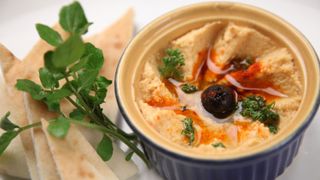
If you have a tendency to wake up hungry in the night, you may be able to prevent it by having hummus as a side dish with your evening meal. It's a great source of tryptophan, which the body uses to help make melatonin and serotonin. Melatonin helps regulate the sleep-wake cycle, and serotonin is thought to help regulate appetite, sleep, mood, and pain.
4. Almonds
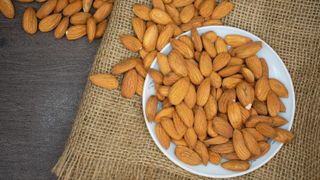
Another great source of tryptophan, almonds also contain magnesium, and both of them can help reduce muscle and nerve function while steadying your heart rhythm. You can get the same therapeutic effect from almond butter; spread it on a cracker or a piece of toast; just don't go overboard and get too full before you go to bed.
5. Walnuts
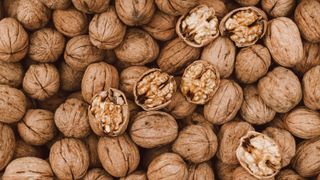
If you're not keen on almonds, give walnuts a try instead. They're packed with compounds that can help you sleep better, including melatonin, serotonin and magnesium. Either munch them whole, or chop them up and have them with a fresh salad or as a topping on cereal or yoghurt.
6. Chamomile tea

Many dismiss the benefits of chamomile tea as an old wives' tale, but it has been proven to help with insomnia. Chamomile contains a flavonoid compound that is known to have sleep-inducing properties, so once your taste buds become accustomed to the unusual flavour, a cup a night before bed could work wonders.
7. Watermelon
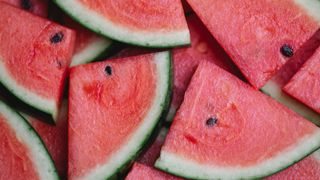
If you mainly drink tea, coffee and alcoholic drinks, you're likely to experience bouts of dehydration thanks to their diuretic effects, especially if you don't drink enough water. Dehydration not only compromises your energy levels, but also impacts your ability to fall – and stay – asleep.
Treating yourself to watery fruits such as watermelon can make up for deficits. A two-cup serving is half water, and will hydrate you before bed as well as eliminating post-dinner hunger pangs due to its fibre and volume. Other fruits with high water content include pears, oranges and apples.
8. Pistachios
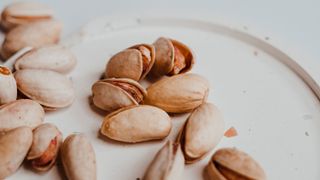
Pistachios are packed with protein, magnesium, and vitamin B6, all of which can contribute to a better night's sleep. Just don't overdo it with them; a one-ounce portion should be your maximum; any more and all those calories can reverse the effect and keep you awake.
9. Oatmeal
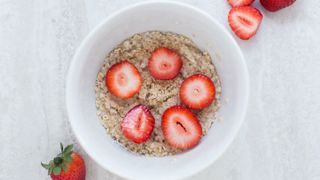
It's a breakfast staple for many, but a bowl of oatmeal at bedtime could help you sleep better. The grains in oatmeal trigger insulin production, which raises your blood sugar naturally and makes you feel sleepy. Oats are also rich in melatonin, which relaxes the body and helps you fall asleep.
10. Bananas
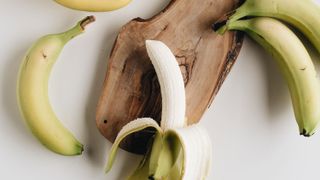
Not feeling sleepy? Have a banana! They're packed with potassium and magnesium, which are known to relax the muscles. They also contain the L-tryptophan amino acid, which gets converted to 5-HTP in the brain, and is then converted again to serotonin, a relaxing neurotransmitter.
Of course there are plenty of foods that you should definitely avoid close to bedtime if you want a good night's sleep. It’s important to steer clear of heavy fried foods, alcohol, caffeine (like coffee, tea, and energy drinks), and any heartburn-inducing foods, such as tomato sauce or orange juice. These can have the exact opposite effect and keep you tossing and turning for longer.









